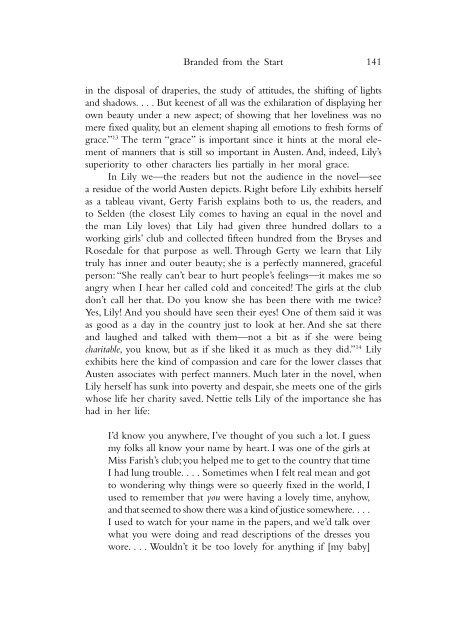You also want an ePaper? Increase the reach of your titles
YUMPU automatically turns print PDFs into web optimized ePapers that Google loves.
Branded from <strong>the</strong> Start<br />
141<br />
in <strong>the</strong> disposal <strong>of</strong> draperies, <strong>the</strong> study <strong>of</strong> attitudes, <strong>the</strong> shifting <strong>of</strong> lights<br />
and shadows. . . . But keenest <strong>of</strong> all was <strong>the</strong> exhilaration <strong>of</strong> displaying her<br />
own beauty under a new aspect; <strong>of</strong> showing that her loveliness was no<br />
mere fixed quality, but an element shaping all emotions to fresh forms <strong>of</strong><br />
grace.” 13 The term “grace” is important since it hints at <strong>the</strong> moral element<br />
<strong>of</strong> manners that is still so important in Austen. And, indeed, Lily’s<br />
superiority to o<strong>the</strong>r characters lies partially in her moral grace.<br />
In Lily we—<strong>the</strong> readers but not <strong>the</strong> audience in <strong>the</strong> novel—see<br />
a residue <strong>of</strong> <strong>the</strong> world Austen depicts. Right before Lily exhibits herself<br />
as a tableau vivant, Gerty Farish explains both to us, <strong>the</strong> readers, and<br />
to Selden (<strong>the</strong> closest Lily comes to having an equal in <strong>the</strong> novel and<br />
<strong>the</strong> man Lily loves) that Lily had given three hundred dollars to a<br />
working girls’ club and collected fifteen hundred from <strong>the</strong> Bryses and<br />
Rosedale for that purpose as well. Through Gerty we learn that Lily<br />
truly has inner and outer beauty; she is a perfectly mannered, graceful<br />
person: “She really can’t bear to hurt people’s feelings—it makes me so<br />
angry when I hear her called cold and conceited! The girls at <strong>the</strong> club<br />
don’t call her that. Do you know she has been <strong>the</strong>re with me twice?<br />
Yes, Lily! And you should have seen <strong>the</strong>ir eyes! One <strong>of</strong> <strong>the</strong>m said it was<br />
as good as a day in <strong>the</strong> country just to look at her. And she sat <strong>the</strong>re<br />
and laughed and talked with <strong>the</strong>m—not a bit as if she were being<br />
charitable, you know, but as if she liked it as much as <strong>the</strong>y did.” 14 Lily<br />
exhibits here <strong>the</strong> kind <strong>of</strong> compassion and care for <strong>the</strong> lower classes that<br />
Austen associates with perfect manners. Much later in <strong>the</strong> novel, when<br />
Lily herself has sunk into poverty and despair, she meets one <strong>of</strong> <strong>the</strong> girls<br />
whose life her charity saved. Nettie tells Lily <strong>of</strong> <strong>the</strong> importance she has<br />
had in her life:<br />
I’d know you anywhere, I’ve thought <strong>of</strong> you such a lot. I guess<br />
my folks all know your name by heart. I was one <strong>of</strong> <strong>the</strong> girls at<br />
Miss Farish’s club; you helped me to get to <strong>the</strong> country that time<br />
I had lung trouble. . . . Sometimes when I felt real mean and got<br />
to wondering why things were so queerly fixed in <strong>the</strong> world, I<br />
used to remember that you were having a lovely time, anyhow,<br />
and that seemed to show <strong>the</strong>re was a kind <strong>of</strong> justice somewhere. . . .<br />
I used to watch for your name in <strong>the</strong> papers, and we’d talk over<br />
what you were doing and read descriptions <strong>of</strong> <strong>the</strong> dresses you<br />
wore. . . . Wouldn’t it be too lovely for anything if [my baby]
















